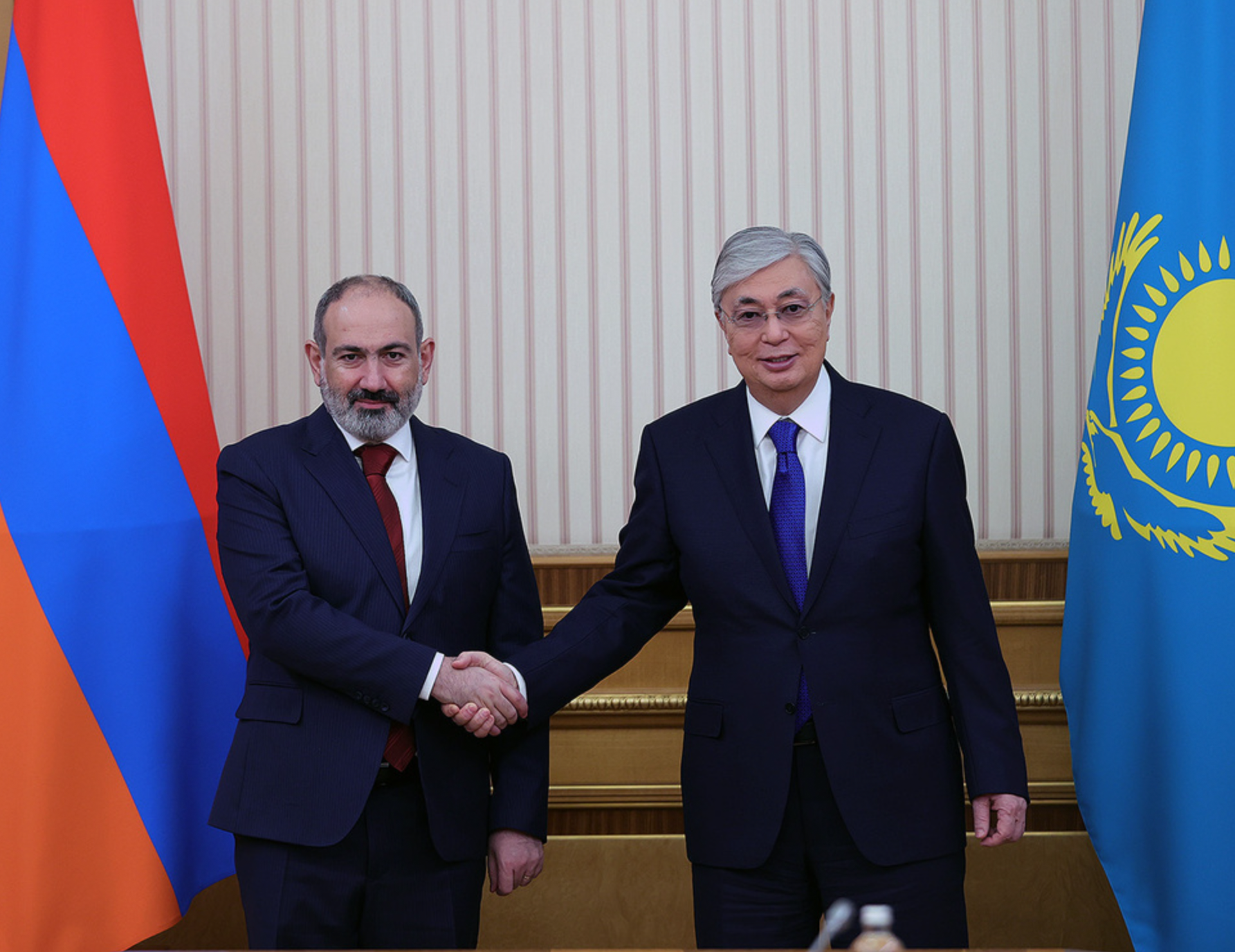Kazakhstan steps in: Bridging Armenia-Azerbaijan divide

During his official visit to Armenia on April 15, Kazakhstan’s President Kassym-Jomart Tokayev made a significant announcement. He stated that Kazakhstan is prepared to facilitate peace talks between Armenia and Azerbaijan, offering itself as a facilitator to help these two nations reach a peaceful solution. But this offer has stirred both hope and scepticism regarding its practicality and potential impact.
To start with, Kazakhstan has an advantage on this end as a mediator. The country's history of mediating the Armenian-Azerbaijani conflict goes back to the early 1990s, when then-President Nazarbayev, along with his Russian counterpart Yeltsin, facilitated the first-ever Armenian-Azerbaijani peace accord. Called the Zheleznovodsk Communiqué of 1991, the agreement aimed to stop violence in Karabakh. But this agreement’s life was cut short by its fundamental call for ceasefire not being adhered to, the most egregious violation being the shootdown of the helicopter carrying a peacekeeping mission, including Kazakhstani Deputy Minister of Internal Affairs as well as Azerbaijani government officials in November 1991. The loss of a high-ranking Kazakhstani official in such circumstances may have contributed to Kazakhstan scaling back its efforts to mediate between Armenia and Azerbaijan.
Kazakhstan has a certain mediation experience; the Astana talks on Syria serve as a prominent example of the extent to which Kazakhstan could play a role in conflict management. Additionally, during its tenure as the Chair of the OSCE, Kazakhstan played a significant role in mitigating the crisis in neighbouring Kyrgyzstan. One notable instance was its intervention in facilitating the removal of the ousted President Kurmanbek Bakiyev from the country. This action helped to alleviate tensions and stabilise the situation in Kyrgyzstan.
Kazakhstan's offer to become a facilitator in the Armenia-Azerbaijan conflict is rooted in its aspirations to deepen engagement in the South Caucasus region. As a landlocked country, Kazakhstan recognizes the importance of enhancing connectivity and access to global markets. Consequently, it views its relations with Azerbaijan and Armenia as pivotal pathways to Europe. By fostering closer ties with these South Caucasus nations, Kazakhstan aims to position itself as a gateway to Europe, leveraging the potential of the Trans-Caspian Trade Route and other regional transportation networks. In this regard, it might have a direct stake in the opening of communications between Armenia and Azerbaijan. Astana also understands that the more stable and peaceful the South Caucasus is, the greater the economic opportunities for Kazakhstan.
With Armenia, the focus lies on enhancing business trade. Despite Astana and Yerevan's partnership in various regional organisations, both of economic and military nature, President Tokayev's recent visit to Armenia is the first one in his five-year tenure. During this meeting, ten documents of varying significance and interdepartmental necessity were signed. Notably, the Roadmap for Trade and Economic Cooperation between the two countries for 2024-2025 was among them. It is important to note that during a joint media briefing with Armenian Prime Minister Pashinyan, President Tokayev stated that Kazakhstan is prepared to increase its exports to Armenia to $350 million.
In turn, Kazakhstan and Azerbaijan share deep historical, cultural, and economic ties, with both countries being key players in the Trans-Caspian Trade Route, also known as the Middle Corridor. As two Turkic states, they also share a strong sense of kinship and mutual understanding. Before his visit to Armenia in April, Tokayev paid a visit to Azerbaijan in March. During this visit, both countries` leaders emphasized the importance of enhancing cooperation in various strategic areas, particularly in the connectivity domain. Additionally, they discussed ambitious projects in digitalisation, artificial intelligence, and infrastructural development. The visit once again underlined the shared vision of Kazakhstan and Azerbaijan for regional integration and economic development. For instance, during the visit, plans were announced to establish an investment fund worth $300 million. Nurlan Zhakupov, Chairman of the Samruk Kazyna Sovereign Wealth Fund, revealed this initiative, stating that the fund will finance projects beneficial to both countries. Moreover, it will facilitate the financing of priority projects across various sectors in the economies of Central Asian countries, as well as Bulgaria, Hungary, Romania, and Turkey. Zhakupov highlighted the commercial nature of the investment fund, anticipating significant profits and emphasizing its potential to strengthen cooperation between Kazakhstan and Azerbaijan.
On the one hand, considering these recent developments and history, some might see Kazakhstan as a potential replacement for Moscow and Brussels in mediating between Armenia and Azerbaijan. With its positive relations with both countries and efforts to further improve them, Kazakhstan seems well-positioned to play a mediating role. The question is whether Armenia and Azerbaijan need another wave of third-party mediation, since all the previous ones have failed in one way or another- not to mention how having a CSTO member state as a mediator could have some unwanted repercussions, given Russia’s traditional role in the region. Therefore, perhaps it would be better for Armenia and Azerbaijan to continue engaging bilaterally, as this remains the only way to shield against potential third-party interference and also serves to build up some trust. As things stand, we have another landmark bilateral deal becoming a reality- on April 19, the Armenian-Azerbaijani border commission came up with a joint agreement that finally put an end to the long dispute over four occupied Azerbaijani villages. The success of the bilateral track should be supported by all means instead of pushing for an alternative.
Even if Kazakh mediation is not acutely needed for the Armenian-Azerbaijani peace process- as for now, neither Russian nor Western one seems to be in demand- there could still be room for Astana to engage simultaneously with its two friends. This engagement could be done in a way that supports the Armenian-Azerbaijani reconciliation. Having Armenian-Azerbaijani exchanges in a wide range of areas, from culture to business, could be essential. Moreover, it's worth noting that Kazakhstan is home to large Armenian and Azerbaijani diasporas. The Kazakhstani government could collaborate with these diasporas to organise interventions, with the ultimate goal of building trust and facilitating conflict transformation.







